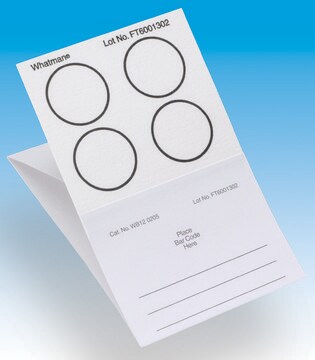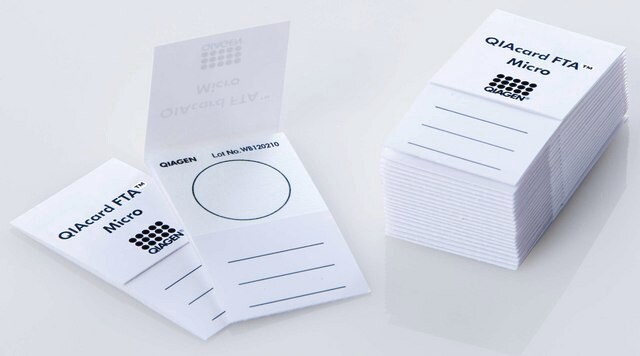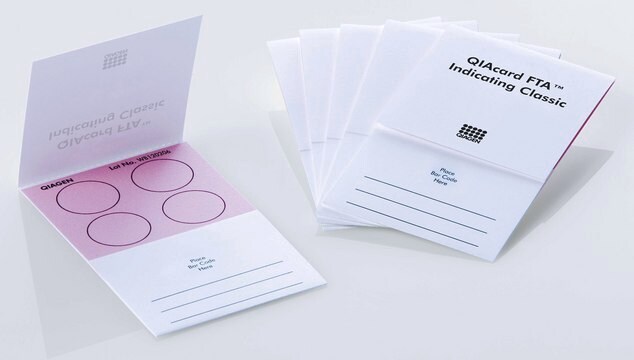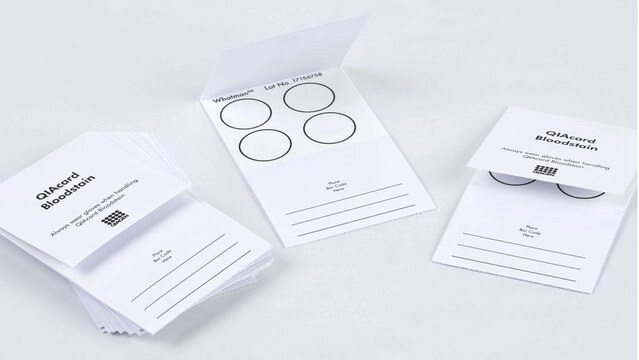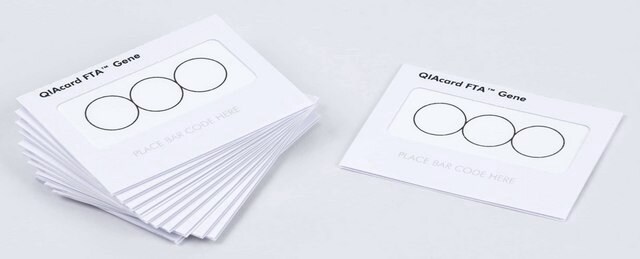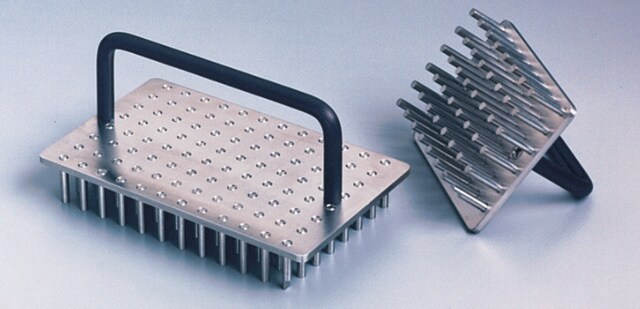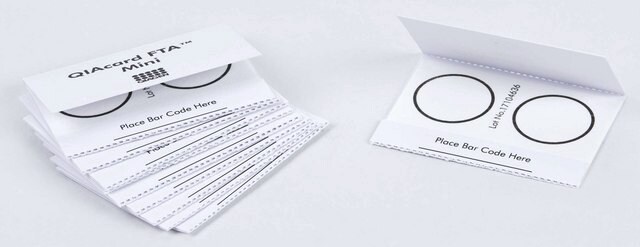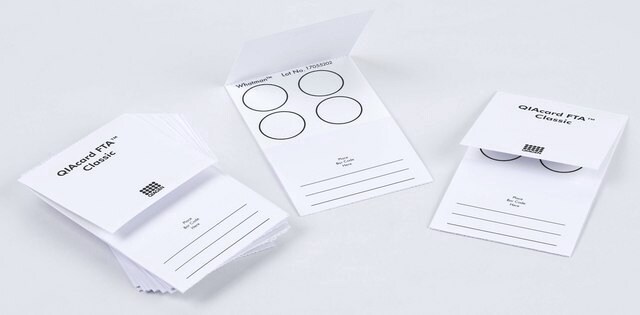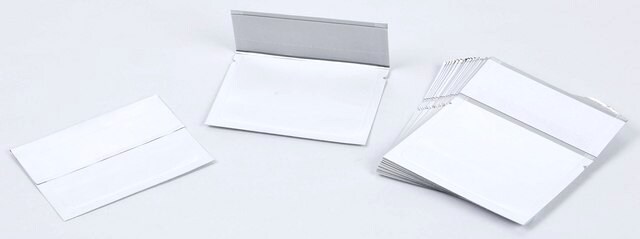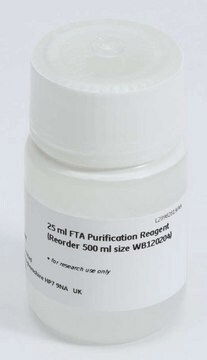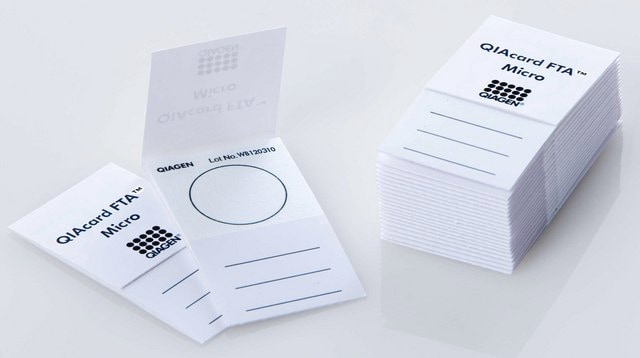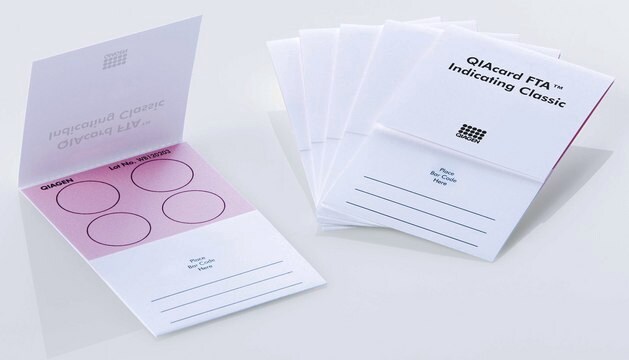WHAWB120055
QIAcard™ Non-Indicating FTA™ Cards
mini, 2 sample areas per card, pkg of 100 cards
Synonym(s):
QIAcard™ FTA™ Mini (100), Whatman FTA, Z719757, whatman fta cards
About This Item
Recommended Products
description
FTA mini card with 2 sample areas per card, 125 μL maximum volume/sample area, 250 μL maximum total volume/card
manufacturer/tradename
Qiagen WB120055
packaging
pkg of 100 cards
suitability
suitable for (isolation, purification and storage of nucleic acids)
General description
QIAcard™ FTA™ Mini format with 2 spot area to collect, stabilize, process, transport, and archive colored samples such as blood. FTA™ technology enables cell lysis on contact, denatures proteins and immediate stabilization and protection of nucleic acids.
FTA™ mini cards utilize QIAcard™ FTA™ technology that simplifies the handling and processing of nucleic acids. FTA™ Cards contain chemicals that lyse cells, denature proteins and protect nucleic acids from nucleases, oxidation and UV damage. FTA™ cards rapidly inactivate organisms, including blood-borne pathogens, and prevent the growth of bacteria and other microorganisms.
Convenient for protocols that require different locations for testing and archiving samples. Different samples can be processed independently.
Application
- Transgenic identification
- Transfusion medicine
- Plasmid screening
- Food and agriculture testing
- Drug discovery
- Genomics
- STR analysis
- Animal identification
- Whole genome amplification
- Molecular biology
Features and Benefits
- Two sample areas for application of up to 250 μl sample volume per card.
- Simply apply your sample to the FTA™ Card. Cell membranes and organelles are lysed and the released nucleic acids are entrapped in the fibers of the matrix. The nucleic acids remain immobilized and are preserved for transport, immediate processing or long-term room temperature storage.
- Since captured nucleic acids are preserved, FTA™ Cards facilitate sample collection in remote locations and simplify sample transport.
- Ship your samples back to the laboratory without expensive special handling or dry ice and process at your convenience.
- FTA™ Cards can be used with virtually any sample type: Blood, Cultured cells, Buccal cells, Plasmids, and Solid tissue.
- Captured nucleic acids are ready for purification when you are. Just take a punch from the FTA™ Card, wash with FTA™ Purification Reagent and rinse with TE-1 (10 mM Tris-HCI, 0.1 mM EDTA, pH 8) buffer. DNA on the washed punch is ready to use in applications such as PCR, SNP analysis, and real-time PCR. Since PCR products remain in solution, the punch can be used for multiple amplifications.
Other Notes
Field of Use : For internal research use only
Legal Information
Signal Word
Warning
Hazard Statements
Precautionary Statements
Hazard Classifications
Acute Tox. 4 Dermal - Acute Tox. 4 Oral - Eye Dam. 1 - Resp. Sens. 1 - Skin Irrit. 2 - Skin Sens. 1 - STOT SE 3
Storage Class Code
13 - Non Combustible Solids
WGK
WGK 3
Flash Point(F)
Not applicable
Flash Point(C)
Not applicable
Certificates of Analysis (COA)
Search for Certificates of Analysis (COA) by entering the products Lot/Batch Number. Lot and Batch Numbers can be found on a product’s label following the words ‘Lot’ or ‘Batch’.
Already Own This Product?
Find documentation for the products that you have recently purchased in the Document Library.
Customers Also Viewed
Articles
Description of common problems that can occur during genomic DNA preparation
This article describes the evaluation of Whatman FTA cards from Cytiva for their ability to collect, store, and isolate high-quality RNA from a variety of crude biological samples.
Polymerase chain reaction (PCR) is a technique that results in exponential amplification of a target DNA sequence.
Protocols
This document shows intructions for EasiCollect™ device from Cytiva.
This study examined the yield and quality of DNA from samples applied to Whatman FTA cards, using five common methods of DNA extraction.
A number of options are available for sample collection, transport, archiving, and DNA purification.
Spectrophotometry can be used to estimate DNA or RNA concentration and to analyze the purity of the preparation.
Our team of scientists has experience in all areas of research including Life Science, Material Science, Chemical Synthesis, Chromatography, Analytical and many others.
Contact Technical Service